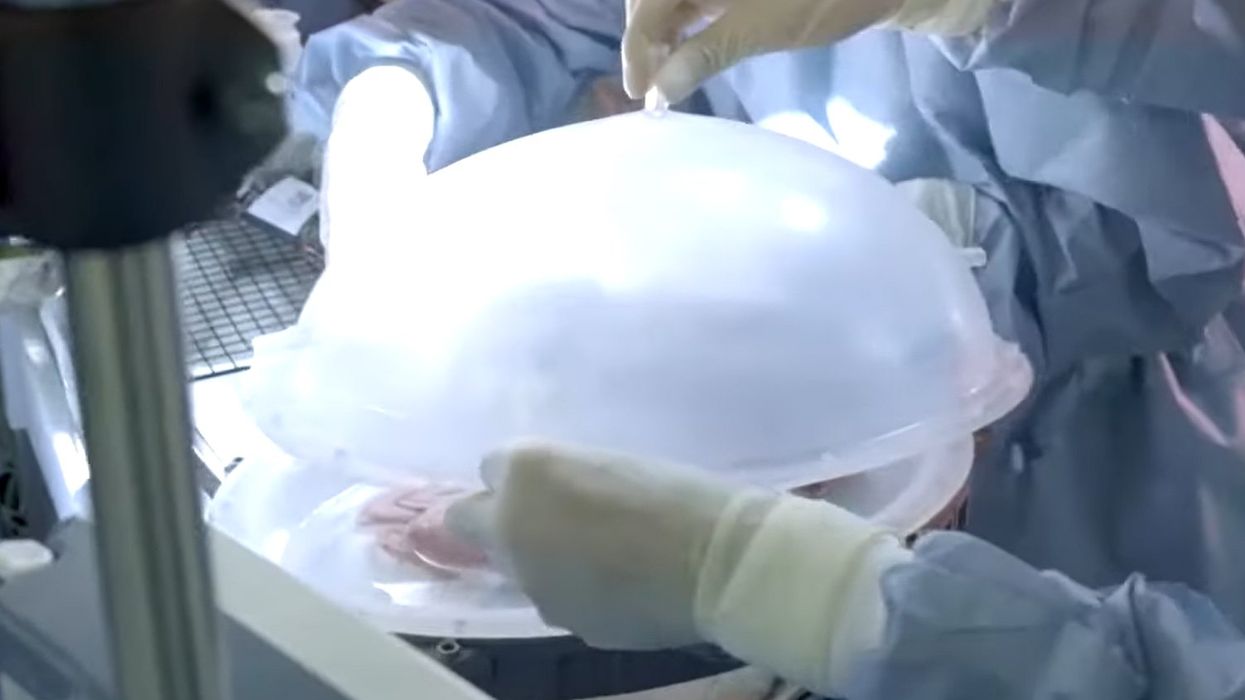
YouTube video, Reuters - Screenshot

Advisers to the U.S. Food and Drug Administration are convening Tuesday and Wednesday for closed-door meetings to discuss the prospect of approving artificial wombs for use in human trials. The FDA's Pediatric Advisory Committee will chiefly address what kind of data scientists will have to produce in the trials and what sort of regulations may be needed.
The unnatural process by which a creature is grown inside a fluid-filled pod, as opposed to inside a symbiotic mother, has been pitched by companies like Vitara Biomedical as a means of increasing survival and improving outcomes for premature babies.
While some scientists are excited by the prospect of potentially helping struggling babies, critics have noted the technology will inevitably result in legal and ethical quandaries.
Nevertheless, Nature reported that researchers at the Children's Hospital of Philadelphia — a hospital that apparently offers medical sex-change interventions to children as young as 8 — are ready to move on from performing artificial womb experiments involving lambs. The lamb CHOP researchers are specifically seeking approval for the first human clinical trials of their extra-uterine environment for newborn development, or EXTEND.
This early technology would not yet entirely eliminate the mother from the equation. Rather than growing a human being from conception to birth, as was horrifyingly depicted in the science fiction film "The Matrix," the CHOP researchers "hope that simulating some elements of a natural womb will increase survival and improve outcomes for extremely premature babies. In humans, that's anything earlier than 28 weeks of gestation — less than 70% of the way to full term, which is typically between 37 and 40 weeks," according to Nature.
Bloomberg reported that premature lambs kept inside the fake womb for up to four weeks were able to develop normally.
Scientists at the University of Toronto executed similar experiments but instead on fetal pigs, having concluded that "there are several questions that remain with regards to the feasibility of translating [fetal sheep] results to human subjects."
Alan Flake, a fetal surgeon at CHOP who has taken the lead on the effort to dehumanize pregnancy, predicted in a 2017 video, "If it’s as successful as we think it can be, ultimately, the majority of pregnancies that are predicted at-risk for extreme prematurity would be delivered early onto our system rather than being delivered premature onto a ventilator."
Recreating the Womb: New Hope for Premature Babiesyoutu.be
A number of CHOP researchers have since joined Vitara Biomedical, a startup that has raised $100 million to develop EXTEND, thanks in large part to First Spark Ventures, a venture capital firm co-founded by former Google CEO Eric Schmidt.
To transition a baby from its mother to the pod, doctors would perform a C-section, albeit of a more complicated variety.
To ensure the baby remains in a "fetus-like state," such that the digestive system does not activate and fluid doesn't drain from its lungs, the surgeons must jab tubes into the baby's umbilical blood vessels then immediately dunk it into a so-called "biobag" filled with a sterile fluid that mimics that found in a real amniotic sack.
The tubes that had been inserted into the baby's umbilical blood vessels would provide it with nutrition, while a so-called membrane oxygenator would provide the baby with oxygen.
George Mychaliska, a pediatric fetal surgeon and researcher at the University of Michigan, told Bloomberg, "It makes sense that if you recreate the fetal environment, babies’ survival rate will increase and, hopefully, their long-term morbidities or health consequences will be diminished."
Nature indicated that there may be implications for abortion and its legality, particularly since fake wombs might make it such that fetal viability extends far earlier than currently recognized.
Earlier this year, pro-abortion radicals noted in Wired that while so-called ectogenesis would "enable people with wombs to reproduce as easily as cisgender men do: without risks to their physical health, their economic safety, or their bodily autonomy," the technology "could significantly weaken abortion policies worldwide."
The article's authors, Rosalind Moran and Jolie Zhou, bemoaned the possibility that without recourse to the "my body, my choice," argument, it may no longer be socially acceptable or legal for women to slaughter their unborn babies.
"Successful ectogenesis would render the fetus viable at a very early stage, possibly even from conception. If ectogenesis—even partial ectogenesis—becomes available, it would then be possible for an unwanted fetus to be transferred into an artificial womb to continue developing without harming a woman’s bodily autonomy, depending on how the fetus is removed," the two pro-abortion radicals wrote. "In this way, women would be able to end their pregnancy without resorting to traditional abortion. Given this option, if a woman chooses traditional abortion regardless, the abortion will appear more like an intentional killing."
Just as the new technology might prove lifesaving, to Zhou and Moran's dismay, it could alternatively expose the unborn grown in scientists' glorified Ziploc bags to various abuses on account of inevitable legal loopholes.
Chloe Romanis, a biolawyer at Durham Law School in the United Kingdom, told Nature that the babies grown in the fake wombs will not be fetuses in the conventional sense.
"The name we give to these new unprecedented patients has implications for rights that the law and society affords," said Romanis.
The FDA advisory meeting takes place at a time in American medicine when it appears many are keen to separate babies from their mothers or, at the very least, pregnancy from women.
In June, the American Medical Association published a peer-reviewed paper in its Journal of Ethics floating the suggestion that there's no moral reason why taxpayers should not subsidize the provision of wombs from dead or living women to transvestites so that they can carry babies.
Could artificial wombs help save premature babies?youtu.be
Like Blaze News? Bypass the censors, sign up for our newsletters, and get stories like this direct to your inbox. Sign up here!